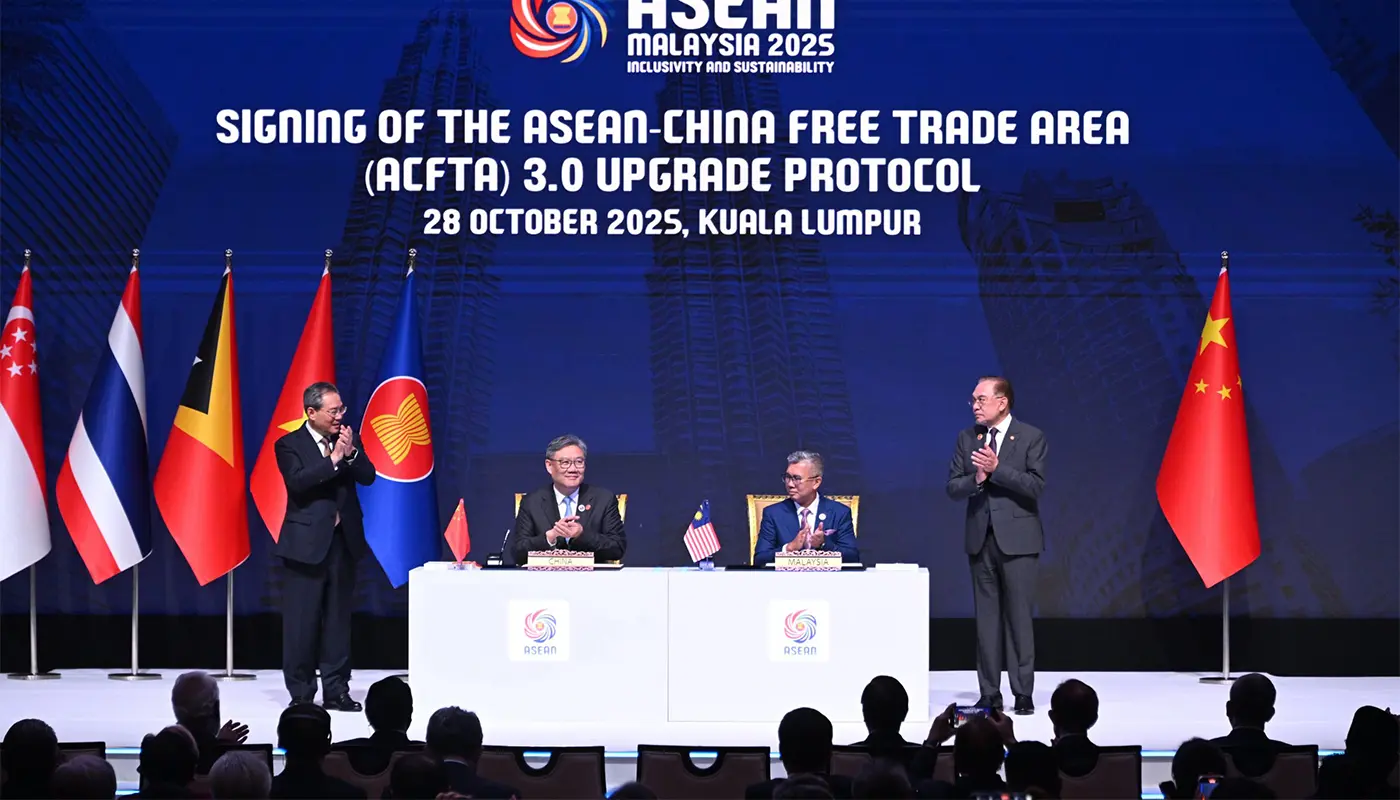KUALA LUMPUR – The 28th Association of Southeast Asian Nations-China Summit convened in Malaysia’s capital on 28 October 2025, drawing together ASEAN leaders, representatives and China’s Premier Li Qiang, alongside Dr Kao Kim Hourn, Secretary-General of ASEAN. The meeting reviewed recent strides in ASEAN-China cooperation and charted future directions to bolster their Comprehensive Strategic Partnership (CSP).
A major highlight of the summit was the signing of the upgrade to the ASEAN‑China Free Trade Area 3.0 (ACFTA 3.0). The upgraded agreement broadens cooperation into areas such as the digital economy, green growth, supply-chain resilience, and support for small and medium-enterprises (SMEs).
According to statements from China’s Ministry of Commerce, the upgrade covers nine key policy areas: digital economy, green economy, supply-chain connectivity, standards and technical regulation, sanitary and phytosanitary measures, customs/trade facilitation, competition/consumer protection, SME cooperation and economic & technical cooperation.
The summit also officially welcomed the adoption of the new Plan of Action to Implement the ASEAN‑China Comprehensive Strategic Partnership (2026‑2030). The document builds on earlier action plans and aims to guide cooperation between ASEAN and China across political, security, economic, social and cultural domains.
During his address to the meeting, Prime Minister Phạm Minh Chính of Vietnam (attending on behalf of ASEAN) reiterated that the ASEAN-China CSP remains “a key pillar for peace and stability in the region, and one of ASEAN’s most dynamic partnerships.”
He outlined three strategic orientations for the next phase of cooperation: advancing smart, inclusive and sustainable connectivity (including via ACFTA 3.0 implementation); promoting innovation and joint science, technology & innovation cooperation (2026-30); and deepening strategic trust alongside regional peace and stability.
Trade and investment figures highlighted the economic weight of the relationship. ASEAN and China recorded two-way trade of approximately US$772.4 billion in 2024, and Chinese foreign direct investment into ASEAN reached about US$19.3 billion.
In the context of regional challenges – from maritime tensions in the South China Sea (East Sea) to shifting global supply chains – the summit’s outcomes carry significance beyond economic cooperation. ASEAN member states and China underlined the need to uphold multilateralism, international law (including the United Nations Convention on the Law of the Sea, UNCLOS) and peaceful settlement of disputes.
For Malaysia, as host of the summit, the event underscores Kuala Lumpur’s role in regional diplomacy and enhances its status in catalysing ASEAN-partner engagements. For the broader region, the ACFTA 3.0 upgrade and 2026-2030 action plan signal a shift toward deeper, higher-quality integration between ASEAN and China – one that moves beyond tariffs to digital trade, green transition and innovation-led growth.
However, translating declared ambitions into on-the-ground delivery remains a task. The action plan’s broad scope – encompassing digital transformation, infrastructure connectivity, sustainable transitions and people-to-people links – demands coordinated institutional effort, monitoring mechanisms and concrete projects across ASEAN member states and Chinese stakeholders.
In sum, the 28th ASEAN-China Summit in Kuala Lumpur marked a pivotal moment: the upgrade of the free-trade framework, the launch of the next five-year action roadmap, and a reaffirmation of the partnership’s strategic importance for regional stability and prosperity.
The success of this phase now depends on aligning policy frameworks, mobilising investment, and ensuring that cooperation delivers tangible benefits for the populations of the region.







